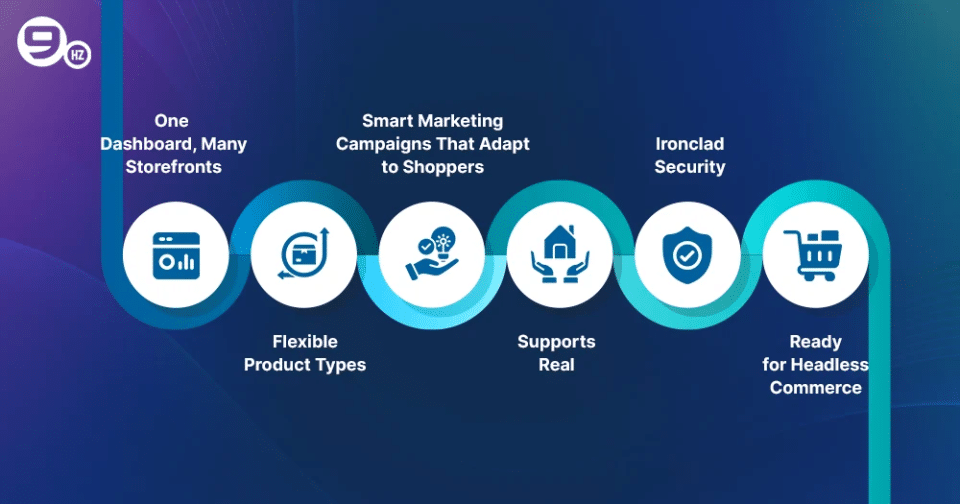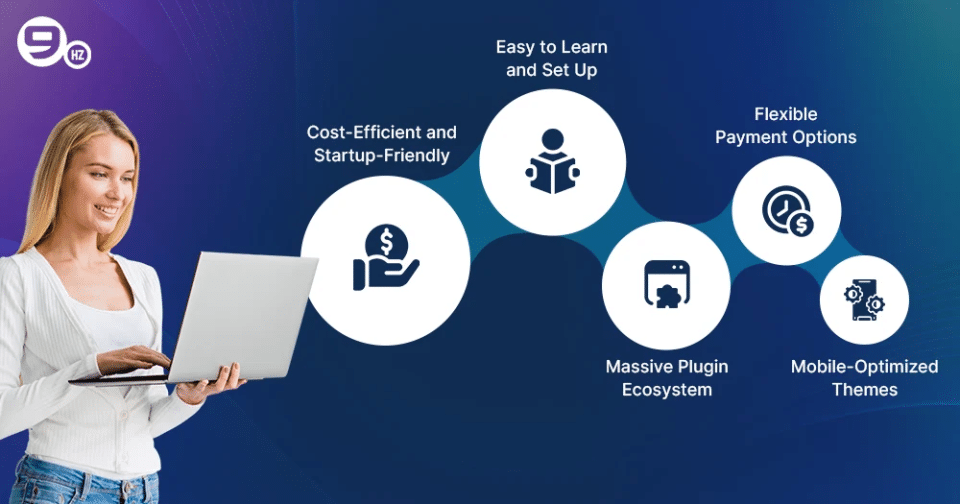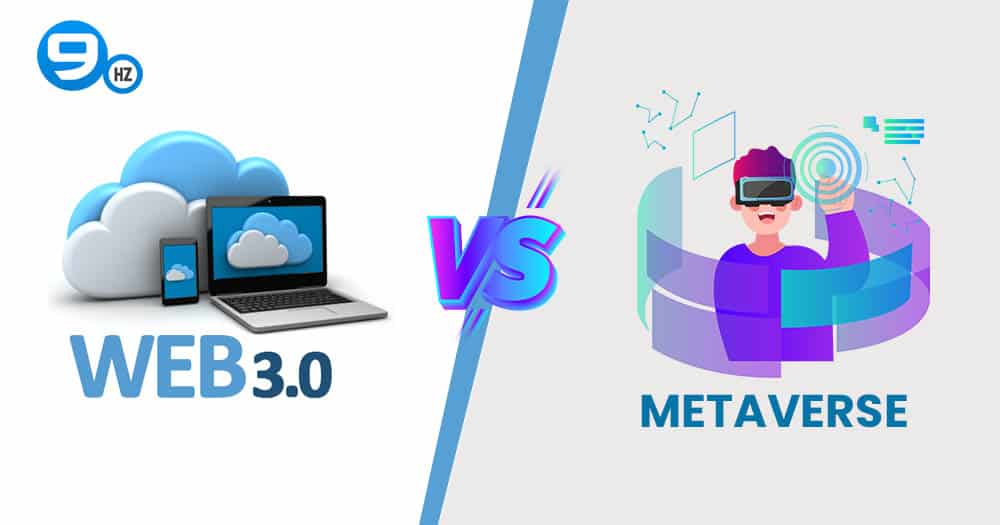Choosing the wrong eCommerce platform is like laying bricks on a shaky foundation — your online store may look good, but cracks will show when your business grows.
With U.S. eCommerce expected to reach $1.31 trillion by 2025 and grow steadily through 2030 with an expected CAGR of 10.35% (Mordor Intelligence), online businesses face more competition than ever.
That’s why choosing the right platform, like Magento or WooCommerce, is critical for long-term success.
So, Magento vs WooCommerce isn’t just a technical debate about which one gets you live faster or provides more plugins. It’s about choosing the eCommerce platform that can adapt as your operations become more complex as you grow.
Both Magento and WooCommerce are flexible and open-source platforms. But their DNA is different.
WooCommerce platform leans on accessibility, content, and ease of use. With over 6 million live stores, WooCommerce leads in adoption. It appeals to small and mid-sized businesses looking for simplicity and quick integration.
Yet many online stores find themselves spending more on optimizations and third-party plugins as their traffic increases.
That’s when businesses often turn to Magento development services for custom solutions that can meet their specific requirements on an enterprise level.
And the shift pays off. Online stores see an average 29% revenue uplift and a 247% ROI within just three years. Even Coca-Cola achieved an 89% conversion rate among returning shoppers after migrating to Magento. This proves the platform’s ability to deliver real business outcomes.
So, which eCommerce business platform fits your future plans? Let’s take a closer look.
Overview of Magento
Magento is one of the most powerful open-source eCommerce platforms available today. Acquired by Adobe in 2018, it’s designed to support large, sophisticated operations with high traffic, multiple brands, and global reach.
Magento comes in two versions:
Magento Open Source: It is free to download but requires self-hosting. It has all the essential eCommerce functionality and supports unlimited products, categories, and customizations.
Adobe Commerce (formerly Magento Commerce): A premium version designed for enterprise-level businesses, it includes advanced features like customer segmentation, B2B functionality, content staging, visual merchandising, and access to Adobe’s full support stack.
Core Features That Set Magento Apart

1. One Dashboard, Many Storefronts
From a single control panel, you can manage multiple storefronts in different languages, using 90+ currencies, each with unique product lines and complying with local tax rules. Thus, this eCommerce platform is perfect for selling worldwide.
2. Flexible Product Types
Sell physical goods, downloadable digital content, or bundled products with custom attributes. Magento’s catalog structure makes such detailed product configurations easy.
In the paid tier, you can also set up personalized product suggestions for different audiences based on their location and past purchases.
3. Smart Marketing Campaigns That Adapt to Shoppers
A Magento store lets you run targeted promotions based on your customers’ shopping behavior. You can set up time-bound offers, tiered pricing for different customer segments, and roll out personalized discounts. You won’t need any third-party tool.
4. Supports Real-Time Unified Customer Profiles
Magento tracks customer activity in real time through email, ads, desktop, mobile, and even support chats.
Say someone browses your store on their mobile, clicks on an offer in social media later, starts checkout on a desktop, and then abandons the cart. Then they open your promo email and complete the payment or interact with a support bot from a tablet. Adobe treats all these as one person’s activity, not multiple separate visits.
That makes it easier to show the products they’re more likely to buy and send emails with relevant offers.
5. Ironclad Security
Magento supports PCI compliance and regularly releases security patches to protect your eCommerce website.
Adobe Commerce Cloud adds extra layers like Web Application Firewall (WAF), protection against Distributed Denial of Service (DDoS) attacks, and automatic disaster recovery, helping safeguard your reputation, revenue, and customers.
Launch a High-Performance Magento Store
6. Ready for Headless Commerce
Magento gives you the option to go headless – separate your online store’s front-end (what customers see) from its back-end (where the data lives). You can also build a Progressive Web App using its PWA Studio, which lets your eCommerce store load faster on mobile, function offline, and even behave like an app that users can add to their home screen.
Pro Tip: Sync Magento’s inventory tools with USA warehouses to keep stock levels spot-on, avoiding stockouts for retailers.
Overview of WooCommerce
“… we hope that it [WooCommerce] can do for democratizing commerce what WordPress has done for democratizing publishing,” said Matt Mullenweg, CEO of Automattic, during the State of the Word 2021 event.
This vision is why WooCommerce is the go-to platform for small businesses and mid-sized companies looking for a fast, flexible way to get online. Built as a WordPress plugin, it transforms content sites into fully functional stores with minimal setup and no licensing fees.
With over 422,024 active WooCommerce stores in the USA and growing at 6% annually, WooCommerce has become a trusted eCommerce platform worldwide.
Core Features That Set WooCommerce Apart

1. Cost-Efficient and Startup-Friendly
WooCommerce is an open-source eCommerce solution and is free to use. You only pay for hosting, any premium themes, or specific functionality you decide to add through extensions. This is ideal for startups and small businesses testing the highly competitive eCommerce landscape.
2. Easy to Learn and Set Up
A built-in Setup Wizard guides users step-by-step through configurations like shipping, tax, and payment gateways. Most store owners can launch within hours, allowing rapid market entry.
3. Massive Plugin Ecosystem
WooCommerce supports 1000+ official extensions and is compatible with thousands of WordPress plugins. You can add custom checkout options, automate email marketing with Mailchimp, integrate analytics, or improve ranking in search engines with the Yoast SEO tool. You won’t need to know coding.
4. Flexible Payment Options
WooCommerce supports Stripe, PayPal, Square, and over 40 regional payment gateways. This makes your eCommerce site compatible with a wide range of international customers.
5. Mobile-Optimized Themes
With 80% of themes built to be mobile-responsive, WooCommerce stores are well-equipped to serve customers who are shopping on smartphones and tablets.
This is crucial because 76% of all visits to U.S. online retail stores happen on mobile devices. If your mobile site lags, you’re likely to lose customers.
Pro Tip: Use WooCommerce Analytics to identify USA customer trends, like seasonal buying, and fine-tune marketing for the mobile shoppers (over three-quarters of retail traffic) to boost sales.
Magento vs WooCommerce: A Head-to-Head Comparison
1. Magento vs WooCommerce: Ease of Use
Magento
- It is built for developers, with a dashboard that comes with a learning curve.
- Even basic configurations (taxes, payment rules) may require backend expertise.
- Customizing themes or managing multi-store setups typically requires developer support.
- The documentation, though comprehensive, is often too technical for store owners without a programming background.
WooCommerce
- It is beginner-friendly and integrated into WordPress, which is familiar to many users.
- It offers a setup wizard that helps even non-technical users launch their store quickly.
- Tasks like adding products, customizing themes, or configuring payment gateways are straightforward.
- You don’t need expensive tech support or coding skills to manage a WooCommerce store.
Verdict: WooCommerce wins for solo founders and small teams. But if you have technical support, Magento’s complexity gives you more control.
Ready to Scale Your Store with Magento?
2. Magento vs WooCommerce: Scalability
Magento
- It has the ability to handle massive product catalogs, with millions of SKUs and over 200,000 orders per hour, when configured correctly, making it ideal for businesses that expect serious expansion.
- Its architecture supports multi-store, multi-language, multi-currency, and regional tax systems — all from a single backend.
WooCommerce
- It also helps you grow. But beyond a point, it relies heavily on premium hosting, caching plugins, and third-party infrastructure like Content Delivery Network (CDN) to maintain performance.
Verdict: Magento takes this round, being better suited for enterprise-level scaling and multi-market expansion.
3. Magento vs WooCommerce: Performance and Speed
Magento
- Magento can deliver lightning-fast page loads — even for stores with thousands of products.
- Varnish Cache stores copies of web pages for quicker loading.
- Redis manages session data efficiently.
- Elasticsearch powers fast, accurate product search.
- Dedicated servers or Adobe Commerce Cloud provide the processing power and memory to handle high traffic.
However, this performance depends on the right technical setup:
WooCommerce
- Performs well on lightweight setups with fast hosting and simple themes.
- Performance can lag when WooCommerce plugins from different third-party developers try to control the same feature, causing plugin conflicts, especially with poor hosting or traffic spikes.
Verdict: Magento has the upper hand under demanding traffic loads.
4. Magento vs WooCommerce: Security
Magento
- Comes with PCI compliance, two-factor authentication, and dedicated security patches.
- Paid tiers provide enterprise-grade protections, including database encryption, content security policies, and threat monitoring.
- However, open-source users must stay proactive by regularly installing updates and security patches.
WooCommerce
- The core plugin is secure, but vulnerabilities often come from outdated third-party plugins or themes – vulnerabilities that hackers exploit.
- Store owners need a WordPress security plugin (e.g., Wordfence) and must stay current with updates.
Verdict: Magento wins, offering stronger, enterprise-grade protection.
5. Magento vs WooCommerce: SEO and Marketing Tools
Magento
- Offers built-in SEO features, including canonical URLs, meta descriptions, sitemap generation, and Google-friendly URL structures.
- Adobe Sensei, available in the paid version, enables AI-driven personalization and dynamic product recommendations.
- However, content marketing requires separate paid extensions.
WooCommerce
- Running on WordPress, WooCommerce excels in content marketing via tools that drive organic traffic.
- Businesses can build authority through blogs, how-to guides, or tutorials, and also optimize product pages and metadata, using plugins like Yoast SEO, Rank Math, or All in One SEO.
- Countless free extensions are available for email marketing, abandoned cart recovery, and Google Shopping integration.
Verdict: WooCommerce benefits from WordPress’s native blogging and SEO features, making it ideal for content-driven brands that want to attract organic traffic. Magento excels when paired with Adobe Sensei personalization.
6. Magento vs WooCommerce: Extensions & Ecosystem
Magento
- It offers 4,000+ extensions via the Adobe Commerce (Magento) Marketplace.
- These modules enable advanced features like layered navigation, custom shipping rules, or marketplace functionality.
- But licensing can be costly, and most modules require developer time to install and configure.
WooCommerce
- Connects to 1000+ native extensions—and unlocks countless more via WordPress, most of which are inexpensive or free.
- You won’t need a developer to install or remove any plugin, whether you want to add product subscriptions, one-click upsells, a loyalty program, or even integrate with your CRM.
Verdict: Magento for depth and power, WooCommerce for speed and simplicity.
Hire Certified Magento Developers for End-to-End Solutions
7. Magento vs WooCommerce: Design & Themes
Magento
- Tools like PWA Studio and Hyvä Themes allow the flexibility of headless builds and lightning-fast interfaces, but setup needs technical expertise.
- There are fewer ready-to-use themes, and creating a customized eCommerce platform requires developer support.
- Businesses that want bespoke storefronts often invest heavily in development time and paid extensions.
WooCommerce
- Gives users access to a large selection of responsive, mobile-ready themes through WordPress, including free and premium options.
- Page builders like Elementor or Divi let you adjust your store’s layout visually, without writing code.
- Even users without design experience or technical knowledge can launch a clean, functional storefront.
Verdict: WooCommerce, with its ready-made themes, suits users looking for a low-effort, affordable way to design their eCommerce store. However, Magento’s custom themes offer the flexibility to create a storefront that can fully reflect the brand identity.
8. Magento vs WooCommerce: Developer Support & Community
Magento
- Has a smaller but highly specialized developer community active on Magento Stack Exchange, GitHub, and Adobe partner forums.
- But support might require the help of teams offering Magento development services, often with Adobe certification.
- Adobe Commerce clients receive 24/7 official support, while open-source users rely on community help.
WooCommerce
- Backed by the massive WordPress universe, with support easily available via forums, tutorials, GitHub, and YouTube.
- Also, most WordPress hosts, such as SiteGround, Kinsta, or WP Engine, offer WooCommerce-specific support.
Verdict: WooCommerce wins for low-cost, easily accessible community support. But Magento is more reliable, being backed by Adobe-certified developers.
Which is better, Magento or WooCommerce?
The final verdict in a Magento vs. WooCommerce comparison comes down to your specific business needs, technical resources, and growth projections.
For large enterprises with complex requirements, Magento is a strong contender. On the other hand, WooCommerce suits smaller businesses that prioritize cost-effectiveness and content marketing.
To help you decide, here’s a side-by-side WooCommerce vs. Magento comparison:
| Feature | Magento | WooCommerce |
|---|---|---|
| Ease of Use | Complex interface with steep learning curve. | User-friendly with an intuitive WordPress dashboard. |
| Scalability | Built for high-volume stores, handles thousands of SKUs and orders across regions. | Scales with proper optimization and premium hosting. |
| Built-in Features | Comprehensive e-commerce functionality. | Basic open-source eCommerce platform with WordPress content features. |
| Extensions | 4,000+ focused on enterprise needs (Amasty, Mageplaza). | 1000+ WooCommerce plugins plus WordPress modules. |
| Content Marketing | Requires additional custom blog extensions. | Excellent native WordPress integration. |
| Performance | Enterprise-level speed with proper server setup. | Fast with optimized WordPress themes and caching. |
| Security | PCI compliant with enterprise-grade patches. | Depends on WordPress plugins + updates, often needing premium extensions. |
| SEO | Strong native SEO, Sensei AI personalisation (Adobe Commerce tier). | Exceptional for content SEO; integrates with the Yoast SEO plugin and Mailchimp. |
| Themes & Design | Built-in responsive design. | Thousands of mobile-first themes; Elementor support. |
| Support | Magento Community (Open Source) and official Adobe-certified developers. | Massive open-source community, plugin documentation, third-party support, and hosting support. |
| B2B Features | Plugin-based. | Native, robust. |
| Best For | Enterprise-level businesses, large catalogs. | Small to medium businesses and content-focused stores. |
Why Choose The NineHertz for Magento Development?
Imagine an online store that handles Black Friday traffic without crashing, syncs effortlessly with your ERP, and remains as easy to manage on day 5,000 as on day one. That’s the kind of eCommerce infrastructure The NineHertz creates with Magento.
As an Adobe Bronze Solution Partner, The NineHertz has delivered over 250 Magento stores in the past decade. With 10+ Magento certifications, they craft performance-ready platforms that grow alongside your business.
Here’s what makes them stand out:
End-to-End Development Capabilities
You want your online store to perform consistently across devices and platforms, regardless of screen size or operating system — from mobile apps to web stores and social channels. Magento solutions by The NineHertz deliver top-notch performance every time.
They offer:
- Mobile App & Headless Commerce – Native or hybrid apps and decoupled front-ends for fast, seamless mobile experiences, and offline capabilities.
- Custom Magento Builds – From bespoke storefront design to backend workflows, tailored Magento 2 development.
- Marketplace & B2B Solutions – Multi-vendor systems, order automation, bulk ordering, and B2B eCommerce tools.
- API Integration – Custom APIs for ERP, CRM, POS, and inventory management systems.
- Extension Development – Build or customize extensions to suit unique needs.
Sector-Specific Implementation
The NineHertz adapts Magento’s flexible architecture to match your business workflows. With almost 15 years of industry-specific experience, they configure cost-efficient eCommerce solutions that reduce operational friction and accelerate time-to-market.
AI-Powered eCommerce Enhancements
AI functionalities that give The NineHertz’s Magento builds a competitive edge:
Certified Magento Expertise
With 100+ Magento Experts, The NineHertz team maintains the best practices in Magento architecture, performance, and security.
Seamless Platform Migration with SEO Continuity
Shifting your eCommerce platform? The NineHertz ensures that your data, SEO performance, and brand identity remain intact, minimizing downtime.
Optimized for Speed and Discovery
By integrating advanced caching strategies, The NineHertz ensures fast loading, responsive shopping, and strong search rankings across all devices.
Continuous Support That Keeps You Live
Their 24/7 support team handles all post-launch tuning like extension updates, feature additions, performance tuning, and bug fixes. Their 92% client retention rate speaks volumes about their long-term reliability.
Conclusion
When you launch your eCommerce store, you face a crucial infrastructure decision – Magento vs. WooCommerce. The choice affects how well your business can adapt, expand, and compete over time.
And like any long-term system choice — CRM, ERP, or finance suite — it’s less about what works today and more about what will still support you in the long run.
Magento is designed for businesses with layered operations, including complex catalogs, regional tax rules, B2B portals, tiered pricing models, and global demands. But it does need the right technical support and long-term investment.
WooCommerce, by contrast, is lightweight and easy to install, configure, and customize. As a WordPress extension, it feels familiar to WordPress site users. For small to mid-sized brands that need to launch quickly and iterate often, it offers real speed-to-market. And while it does scale, continued growth often means investing in tuning, hosting upgrades, and third-party plugins to maintain performance.
So, where does that leave you?
If your roadmap includes:
- Expanding to new markets
- Building a B2B portal alongside B2C
- Managing multiple brands under one roof
FAQ
1. Is Magento a good eCommerce platform?
Yes, especially if you’re running a big operation, dealing with a complex catalog, selling in multiple regions, or managing B2B and B2C operations from the same system. Magento is a heavy-duty engine, powering multiple storefronts and layered pricing without glitches.
However, you’ll need dedicated technical support or hire Magento development services experienced in navigating the setup.
2. How does the cost of running an online store compare between Magento and WooCommerce?
Launching a WooCommerce store can cost as little as a few hundred dollars, depending on how much customization you need. Most small teams can manage it without hiring developers.
But with Magento, even the free version can add up to five-figure costs once you factor in setup, hosting, and dev time.
The paid Magento Commerce platform pricing is quote-based, depending on the number of storefronts, features and integrations the business needs, as well as hosting preferences (on-premise or Adobe Commerce Cloud).
But an IDC report shows an 18% increase in average order values after upgrading to Adobe Commerce. So, considering the returns, the trade-off is often worth it.
3. How do Magento and WooCommerce handle scalability?
Magento is meant to handle growth. It can manage thousands of SKUs, global storefronts, and heavy traffic.
WooCommerce can scale too. But it needs adjustments.
As Devin Price, the CTO of Universal Yums, puts it, “Get some solid hosting. Then you can grow your business on Woo.” Therefore, you need better servers, smart hosting, and careful plugin management to avoid slowdowns.
Great Together!









